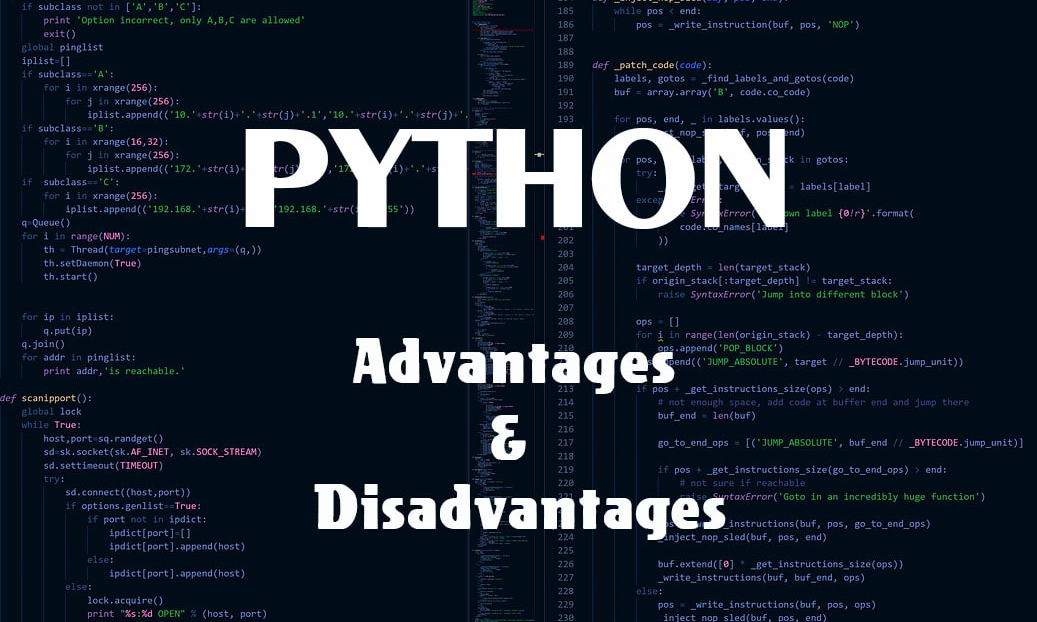Python is a general-purpose, high-level, dynamically typed, and interpreted language known for its easy-to-understand coding syntax and diverse applications in various domains, including web development, data analysis, machine learning, and more.
In this article, we will learn about the advantages and disadvantages of Python, making this multi-paradigm programming language one of the most widely used languages among novice and experienced developers.
Advantages and Disadvantages of Python

Advantages of Python Programming Language
Let's look at some prominent Python advantages that make it easy for developers to work with.
1. Comprehensive Libraries and Frameworks:
One of Python's biggest advantages is its vast ecosystem of libraries and frameworks, which can be used for various tasks, from web development (e.g., Django, Flask) to sophisticated machine learning tasks (e.g., TensorFlow, Scikit-learn). This means that developers can choose a specific domain of interest to study and start a targeted Python learning path.
2. Ease of Learning and Use:
The resemblance of Python’s syntax to natural language makes it a very versatile programming language to consider for beginners and expert developers coming from another coding language expertise, enabling them to focus more on logic building by writing comparatively fewer lines of code rather than complex syntax structure.
3. Highly Embeddable:
The embeddability of Python into other coding languages allows developers to integrate its code into applications written in languages like C++ and Java (e.g., Boost, Jython). This enables developers to implement the functionality offered by Python into existing applications.
4. Automatic Memory Management:
Python offers an automatic memory management feature that eliminates the need for manual allocating and deallocating of memory for developers, primarily through reference counting and garbage collection. This helps developers to optimize the usage of memory and write the code more efficiently.
5. Large Community and Open-Source:
Python is an open-source programming language that leverages a large and active community, contributing to its extensive documentation and support resources. This plays a vital role in the learning journey of a new developer, where they can ask questions and learn from expert Python developers.
Disadvantages of Python Programming Language
Along with several pros, the language has some limitations in performance and security. Let us discuss them below.
1. Slow Execution Speed:
One of the main disadvantages of Python is that, being an interpreted language, it is slow compared to other compiled languages like C++ and Java. Compiled languages mean that all the lines of code are converted into machine code before they are executed, making them faster compared to an interpreted language, where each line of code is executed one at a time by the interpreter. This can be an issue for the performance of extensive tasks which makes it a difficult choice for performance-critical applications.
2. Dynamically typed:
Python, as a dynamically typed language, enables developers to determine the data type of a variable at runtime based on its value without the need for explicit type declarations of the variable. While this flexibility simplifies coding and makes it easier to write, it can also introduce errors and unexpected behavior, requiring more frequent testing and debugging efforts.
3. High Memory Consumption:
Python’s dynamic nature and interpreted execution can also lead to higher memory usage compared to other compiled languages used for similar application development. This can be especially problematic in building applications in resource-limited environments, such as embedded systems or mobile devices, where memory constraints can impact the overall performance of the system.
4. Threading Limitations:
Although Python does have a threading module that offers the functionality of multiprocessing, it doesn’t natively achieve true multithreading due to the Global Interpreter Lock (GIL). Python's GIL acts as a mutex (mutual execution lock) that prevents multiple native threads from executing Python bytecodes at once. This limits the performance of multithreaded applications, making it less efficient for tasks requiring concurrent execution.
5. Database Interaction Challenges:
Although Python provides robust tools for interacting with relational databases like MySQL and PostgreSQL and non-relational databases like MongoDB, it presents several challenges, including connection management, SQL query complexity, and data type mapping. Compared to other popular technologies such as JDBC and ODBC, the Python database access layer is a little underdeveloped and primitive making it unsuitable for developers looking for a smooth interaction of complex legacy data.
Python Advantages and Disadvantages
Advantages | Disadvantages |
|
|
Conclusion
Python continues to stand out as a leading programming language because of its simplicity, flexibility, and vast ecosystem of libraries.
Its consistent top ranking, holding 25.87% in the TIOBE Index in 2025, speaks volumes about its widespread adoption across domains such as data science, machine learning, and web development. That said, while Python offers clear advantages, it's essential to consider its limitations in terms of performance and memory efficiency when planning project execution.
Ultimately, the success of a Python-based initiative often depends not just on the language itself but on the expertise behind it, which is why many organizations choose to hire Python developers who can harness its full potential while navigating its constraints with confidence.
Frequently Asked Questions
Q. What types of projects are a poor fit for Python?
While Python excels in many domains, it may not be ideal for applications requiring real-time performance, such as game engines or high-frequency trading systems, low-level hardware interaction, or mobile-native apps where resource efficiency is crucial.
Q. How secure is Python for enterprise-level applications?
Python is secure when best software development practices are followed, such as using virtual environments, updating dependencies, and applying proper input validation. That said, specific third-party packages may have vulnerabilities, so regular audits and dependency management are key in enterprise settings.
Q. What are the most in-demand Python specializations in 2025?
Today, Python professionals with expertise in machine learning, AI/LLM fine-tuning, web automation, DevOps scripting, and data engineering are particularly sought after.
Q. What certifications or credentials can boost credibility as a Python developer?
Certifications like PCAP (Certified Associate in Python Programming) and PCEP (Certified Entry-Level Python Programmer) are great for validation. But equally valuable are public contributions to GitHub repos, open-source projects, and showcasing hands-on project experience.
Q. How can staff augmentation services benefit Python-based projects?
IT staff augmentation services allow companies to quickly scale Python teams by adding skilled developers on demand. It’s a flexible, cost-efficient way to handle evolving project needs without the overhead of permanent hiring, ensuring smooth delivery and technical continuity.


